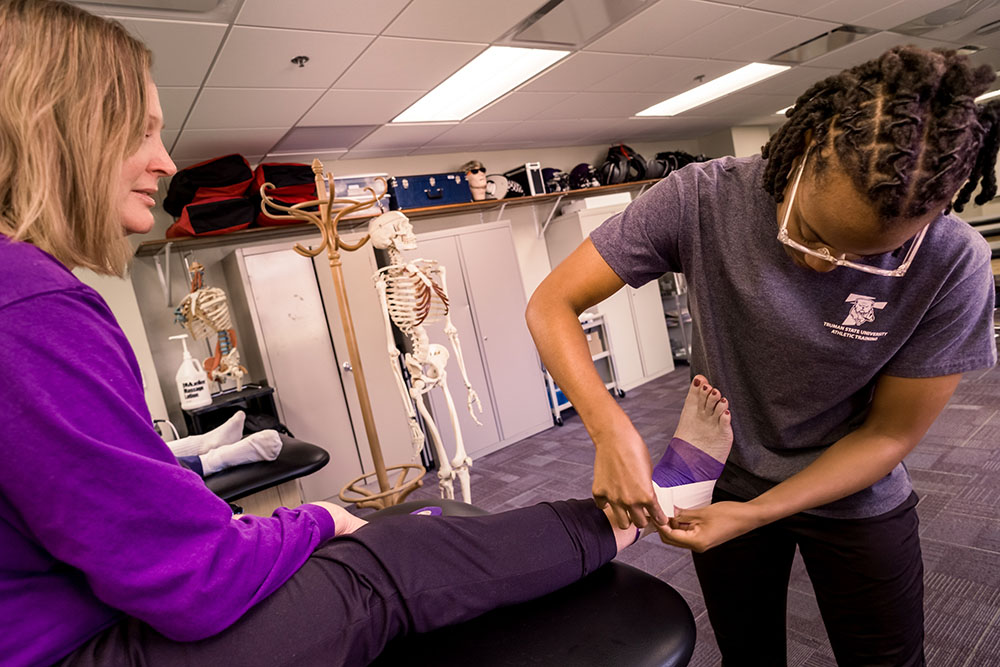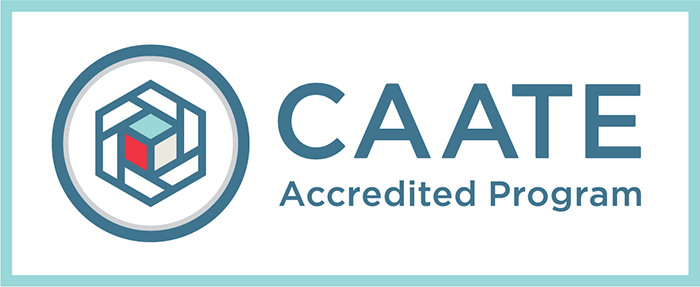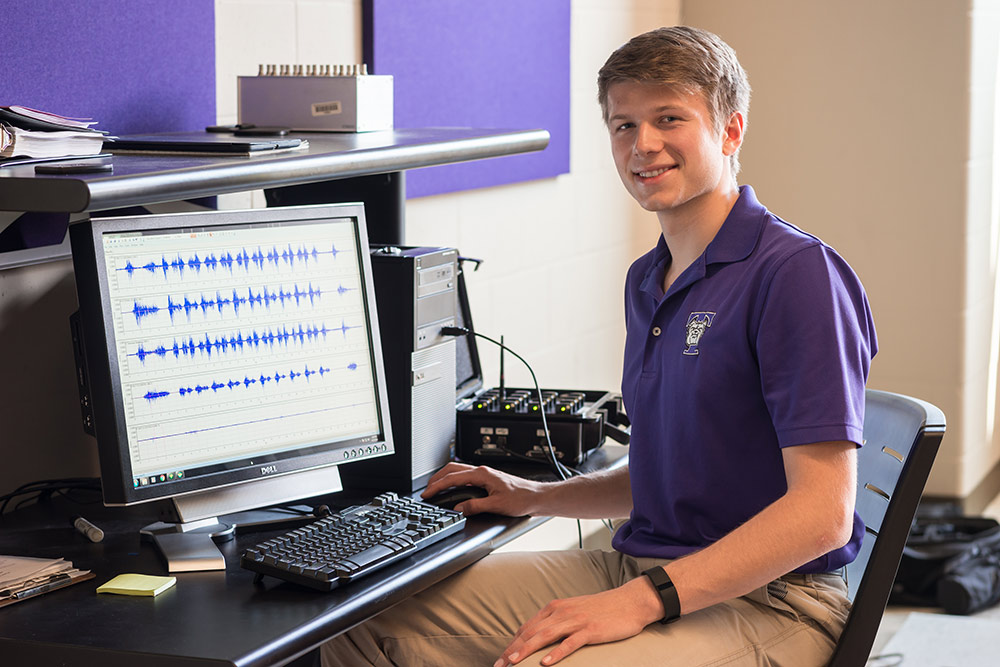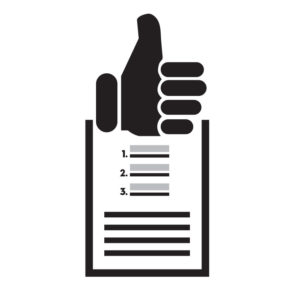
Our Master of Athletic Training (MAT) program provides you with specialized coursework and practical experience that prepare you for a successful career in athletic training. Through broad-based professional preparation combined with close collaboration with professors and progressive clinical experiences, you’ll graduate from the program with the knowledge, skills, and experience to take the national Board of Certification (BOC) exam to become a certified athletic trainer.
Why Truman?
- Small, personal classes
- Tremendous value — high quality at low cost
- Strong connection and collaboration with physicians and health care professionals
- Individualized attention
- Clinical experiences enhance every phase of your learning
- Specialized coursework covers Athletic Training, Exercise Science, and Clinical Practice
- Greater than 90% first-time BOC pass rate
- 100% job placement
Accreditation
Our high-quality professional program is accredited by the Commission on Accreditation of Athletic Training Education (CAATE).

Curriculum
MAT Curriculum & Course SequencingBecome familiar with the roles, functions, and professional preparation of an athletic trainer well as the history of the profession and its governing structures.
Learn methods of bracing, wrapping, and taping for athletic and sport needs through didactic and clinical experience.
Study emergency care procedures through didactic and clinical experience and learn how to recognize an the appropriate care for an emergency situation.
Explore the anatomical and physiological basis of physical activities, including the functional anatomy, which includes the skeletal, articular, and muscular systems as they affect movement, as well as the nutritional concepts that fuel movement.
Acquire knowledge and skills necessary for the administration of an athletic training program through course content covering administrative components of athletic training, physical exams, legal issues, emergency planning, record keeping, athletic training facility design, and administrative/leadership skills.
Examie issues that shape the athletic training profession with an emphasis on practical application and professional development.
Study the practical application and professional development such as lab reports, imaging results, life-span issues, and evidenced-based practices.
Integrate research design principles (variables, validity, etc) with statistical analysis to see how design and analysis of experiments work in concert to answer questions relevant to the profession of athletic training.
In this course, you learn about other allied health professions and collaboration for optimal patient care and participate in Interprofessional Health Partners in conjunction with ATSU and discussion groups with other healthcare students.
Discover the proper methods of musculoskeletal evaluation of the upper extremity, thorax, spine, and head and learn the mechanical and physiological basis of injury and injury evaluation techniques.
Discover the proper methods of musculoskeletal evaluation of the lower extremity and learn the mechanical and physiological basis of injury and injury evaluation techniques.
Develop a basic understanding of injury and rehabilitation psychology and its applied application to a variety of physically active populations.
Acquire the knowledge and skills to utilize a variety of therapeutic modalities and a detailed understanding of the psychological and physiological processes of pain and healing.
Learn the appropriate use of physical rehabilitation for musculoskeletal injuries and acquire a scientific and physiological rationale, selection criteria, indications and contraindications of exercise, and return to activity guidelines.
All AT 619G students are at this time are accepted into the MAT program. You complete the HIPAA, FERPA, and OSHA (active communicable and infectious disease policy) required trainings. This course serves as an introduction to the athletic training clinical component procedures and policies, application of preventive athletic devices, environmental concerns, and the pre-participation exam.
This course serves as a process for monitoring student progression of athletic training competencies, acquiring clinical hours under the direct supervision of a certified athletic trainer, and reinforcing and instructing new information about modalities and lower extremity assessments.
This course serves as a process for monitoring student progression of athletic training competencies, acquiring clinical hours under the direct supervision of a certified athletic trainer, and reinforcing and instructing new information about therapeutic rehabilitation techniques and upper extremity assessments.
This course provides students the opportunity to utilize and apply their classroom knowledge in a practical/hands-on setting.
This course serves as a process for monitoring student progression of athletic training competencies, acquiring clinical hours under the direct supervision of a certified athletic trainer, and reinforcing and instructing new information about pharmacology issues and sport and injury psychology.
Gain more in-depth experience in the field of athletic training by selecting a field experience that meets your professional goals.
Exercise Science/Master of Athletic Training 3+2 Program
Students enrolled in the Truman ES/MAT 3+2 program will complete 159 credit hours in five years to earn both the Bachelor of Science in Exercise Science and the Professional Master of Athletic Training degree.
Learn more>
Students who wish to pursue a Master’s degree in Athletic Training must have an earned Bachelor’s degree and meet the prerequisite course requirements for admission consideration unless the student is pursuing the Truman ES/MAT 3+2 program. The following Truman courses satisfy these requirements:
- Human Anatomy
- Human Anatomy Lab
- First Aid and CPR
- Nutrition for Health, Fitness, and Sport
- Human Physiology
- General Psychology
- Basic Statistics
- Biology
- Chemistry for Contemporary Living
- Concepts in Physics
Graduate Assistantships

Truman offers Graduate Teaching/Research Assistantship (GTRA) positions for qualified applicants pursuing graduate studies such as the Master of Athletic Training.
Cohort-based Admission
A new Master of Athletic Training cohort begins the program every year in July. The final deadline to apply for the next cohort is June 1. Applications are reviewed as they are received, so apply early for priority consideration.
July Start → Apply by June 1
Admission Requirements
No GRE required. In addition to the online application ($40 fee) to apply for the Master of Athletic Training Program, you’ll need to submit the following:
Tuition
Missouri residents and non-residents pay the same tuition and fees for the Master of Athletic Training program.
*Total estimated tuition based on 2024-25 academic year. Tuition subject to change.
Financial Aid
There are no MAT degree scholarships or out-of-state tuition waivers at this time. On-campus employment opportunities are handled through the Payroll Office. It is not recommended that an MAT student work full time. A part-time job may be possible as long as it does not interfere with classroom or clinical experience hours.
Some students may qualify for a Graduate Teaching/Research Assistantship (GTRA) position once enrolled in the MAT program. GTRAs are either a cash stipend or a tuition waiver for up to nine graduate credits per academic semester that is awarded by the individual graduate program and Truman State University. GTRAs are available during the academic year (August-May).
For more information, contact the Financial Aid Office or the Athletic Training Program Director.
Admission Pathways

Direct/Automatic Admission
Students may enter the Truman Master of Athletic Training (MAT) program via the Direct/Automatic Admittance route.

ES/MAT 3+2 Program
Earn a Bachelor of Science in exercise science and a Master of Athletic Training in 5 years.
More Details About the MAT Program
Schedule a Visit

Virtual or In-person
Get an inside look at program specifics, tour your learning environment, and meet your professors.




